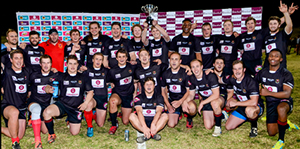
The forwards of Vishuis laid a strong foundation in
the K1 rugby final against Kagiso. This helped them
to secure a win of 38-16.
Photo: Marelize van Niekerk
They have not only been dominating the residence rugby scene at the University of the Free State over the past few years, but also nationally. Although they might experience added pressure as favourites, a key ingredient to Vishuis’ success story is their enjoyment of the game and their camaraderie.
According to Henco Posthumus, the Vishuis captain, they realise that it still remains residence rugby. “The guys pitch up at practice because they want to play, not because somebody begged them to.”
Comfortable triumph in final
Vishuis claimed their fifth Varsity Cup Koshuis title earlier this year, and will defend their national title after being crowned Kovsie residence champions on 8 September 2017. They beat Kagiso comfortably 38-16 in the K1 final, after leading by 31-9 at half-time.
Posthumus says the fun element is often forgotten, but not at Vishuis. He says it is not just about the first team either. “Almost every house member, no matter if he studies medicine or if he hasn’t played rugby before, is playing a bit of rugby on a Friday evening. That is also why we, as a fairly small residence, can field five teams.”
More than just a game
Although their proud record serves as motivation, it is about more than just rugby. “The guys grow together in different ways. It is an honour to see how they grow during a season, also spiritually.”
They have been lucky not to suffer many serious injuries over a number of seasons, Posthumus says. “We are privileged to have 110 years of history behind our residence, and people from within and outside buy into who we are.”
“Our (new) coach, Zane Botha, is also a valuable acquisition. He has taken our rugby to the next level.”